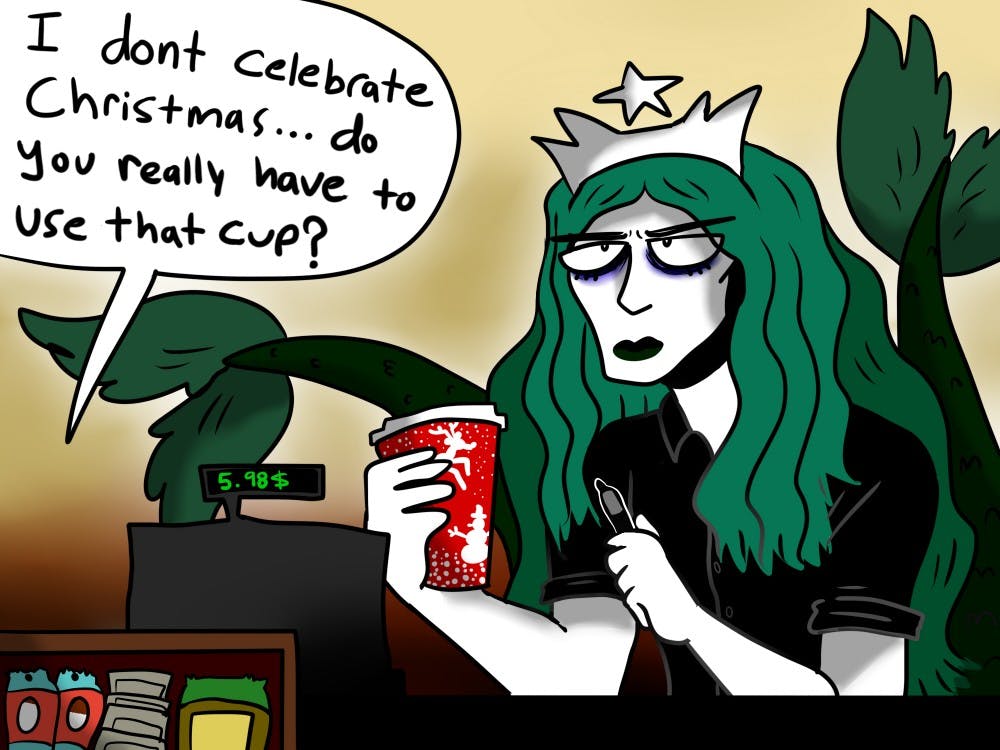’Tis the season to get riled up about coffee cups.
Every year, some aspect of the holiday season is diminished just a little bit by the manner in which people react to certain changes around the holiday season, including the way people wish one another happy holidays and yes — Starbucks cups.
In a time where the general motivation is to be giving and accepting in nature, the controversy and outrage is awfully misplaced. The holidays have historically been about bringing people together rather than inciting argument.
With the multiple Starbucks locations on the ASU campus, students are no strangers to the changes which occur around the holiday season.
Grabbing a quick cup of coffee between classes or with friends is the norm. Tiptoeing around addressing the holiday spirit in fear of offending others should not be.
In a statement on the Starbucks Newsroom website, “Starbucks holiday cups became emblematic of the holiday, with designs that reflect the joy of the season with scenes of celebration and gathering.”
This year, their cup design features “a white heart framed by two hands coming together.”
Although seemingly innocuous, this still received backlash over the internet with some claiming that Starbucks was trying to push a gay agenda, because the hands were non-gendered.
Joshua Kane, an instructor at ASU’s College of Integrative Science and Arts, offered a reason as to why people tend to feel upset over holiday cheer.
“Generally when any group has been dominant – white Christians have been – and when they lose that, losing that positive consequence (of saying 'Merry Christmas') feels like an attack because this is what they’ve always had and that’s a change they don’t like,” Kane said. “But this has nothing to do with race or religion and everything to do with groups.”
While certain groups feel attacked over the loss of “Merry Christmas,” others feel offended by its existence.
“You have core conservatives where people not saying ‘Merry Christmas’ feels like an attack and then you have the more liberal-minded people (accepting of social change) who understand social change and are understanding of others,” Kane said. “People who are accepting of social change need to accept that social change is hard for a lot of people.”
The two groups of conflicting social beliefs that exist at ASU should not be reason for students to feel as though they can’t express themselves a certain way.
Many argue that, on college campuses, free speech is already sacrificed enough to political correctness. Students are forced to consider whether they should wish people a happy holiday the way they want to, the way they must do so to avoid offending someone, or simply not at all.
Alden Weight, an instructor at ASU’s College of Integrative Sciences and Arts, explained the impacts of limiting expression of the holiday spirit.
“Limitations on free expression of speech have a chilling effect on behavior,” Weight said. “If the holiday expression should be avoided, should other behaviors associated with the holiday be avoided as well? … Continuing with the hypothetical, this chilling effect could actually undermine the holiday itself in behavioral and economic terms.”
The whole Starbucks debacle that occurs year after year can simply be avoided by adopting a more accepting view of the holiday season.
“The critics somehow managed to find anti-Christmas meaning in a cup with traditional Christmas colors and no other visible symbolism,” Weight said. “As Taylor Swift once sang, presumably with more insight about modern critical dynamics than she ever realized, ‘Haters gonna hate.’”
Students should be able to enjoy the holidays at ASU without worrying about sacrificing either free speech and political sensitivity – it simply takes the effort of the student body to realize the positive message behind the different ways in which people express themselves.
Reach the columnist at kalbal@asu.edu or follow @KarishmaAlbal on Twitter.
Editor’s note: The opinions presented in this column are the author’s and do not imply any endorsement from The State Press or its editors.
Want to join the conversation? Send an email to opiniondesk.statepress@gmail.com. Keep letters under 500 words and be sure to include your university affiliation. Anonymity will not be granted.
Like The State Press on Facebook and follow @statepress on Twitter.




